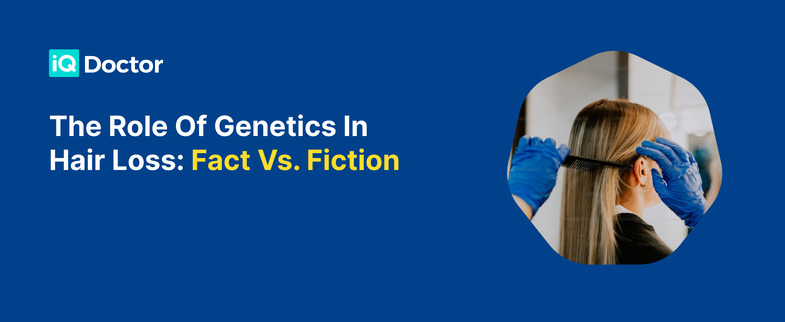The Role Of Genetics In Hair Loss: Facts Vs Fiction
13 August, 2023 | Jane Thomas - Marketing

Hair loss is a common concern that affects millions of people worldwide. While there are various factors that contribute to hair loss, genetics is often at the forefront. This blog will delve into the intricate relationship between genetics and hair loss, debunking myths and shedding light on the truths surrounding this phenomenon. In addition, we will explore the use of hair loss tablets like Propecia (finasteride) 1mg in addressing genetic hair loss.
Androgenic alopecia: Is it hereditary?
Androgenic alopecia, commonly known as male or female pattern baldness, is the most prevalent type of hair loss. Genetics plays a significant role in androgenic alopecia, as the condition is hereditary. Individuals with a family history of baldness are more likely to experience it themselves. This genetic predisposition can be attributed to the influence of hormones and the sensitivity of hair follicles to them.
The role of genetic markers
Research has identified specific genetic markers associated with hair loss susceptibility. Studies have shown that variations in certain genes influence the likelihood of developing androgenic alopecia. However, it's important to note that genetic factors are not the sole contributors to hair loss. Environmental factors, hormonal imbalances and lifestyle choices also play a role.
Myths surrounding genetics and hair loss
There are several myths surrounding the genetics of hair loss. One common misconception is that if your mother's father had a full head of hair, you won't experience hair loss. In reality, genetic factors can come from either side of the family. Another myth suggests that hair loss skips a generation, but this isn't always the case. Genetics is a complex interplay of various factors, making predictions challenging.
Treating genetic hair loss: What are your options?
Addressing the effects of DHT with hair loss tablets
DHT is a hormone that plays a key role in the development of androgenic alopecia. In individuals with a genetic predisposition to hair loss, hair follicles on the scalp become more sensitive to the effects of DHT. Over time, exposure to DHT causes the hair follicles to shrink and produce thinner, shorter hair strands in a process known as miniaturisation. Eventually, the follicles become incapable of producing visible hair, leading to baldness.
What is Propecia (finasteride) and how does it work?
One of the treatment approaches for genetic hair loss involves the use of hair loss tablets, such as Propecia (finasteride) 1mg. Propecia is an oral medication that is FDA-approved for the treatment of androgenic alopecia in men. It's not recommended for use by women.
Propecia works by inhibiting the enzyme 5-alpha reductase, which is responsible for converting testosterone into DHT. By reducing DHT levels in the scalp, Propecia helps slow down the miniaturisation of hair follicles and can promote the growth of thicker, healthier hair strands. The medication primarily targets the crown and middle of the scalp, areas that are commonly affected by genetic hair loss.
Efficacy and benefits of Propecia (finasteride)
Propecia has demonstrated efficacy in numerous clinical studies, showing that it can significantly slow down hair loss progression and even lead to regrowth in some individuals. Users often report increased hair density and improved hair quality. However, it's important to note that results vary among individuals. Some users may experience more noticeable results than others, and the degree of improvement can be influenced by factors such as the extent of hair loss and individual responsiveness to the medication.
How long does Propecia 1mg take to work?
It's essential to set realistic expectations when using Propecia 1mg. While some individuals may experience positive changes within a few months of starting treatment, it generally takes several months (usually around three to six) to observe noticeable improvements in hair growth and thickness. Consistency in taking the medication as prescribed is crucial for achieving optimal results.
Before starting Propecia 1mg or any other hair loss treatment, it's crucial to consult a healthcare professional, preferably a dermatologist or a healthcare provider with expertise in hair loss. They will evaluate your individual condition, medical history and potential contraindications to ensure that the medication is safe and appropriate for you.
Are there any potential side effects of Propecia 1mg?
Like any medication, Propecia 1mg may have potential side effects. While they are rare, they can include sexual side effects, such as decreased libido or erectile dysfunction. It's important to discuss any concerns or potential side effects with your healthcare provider before starting the medication.
In conclusion…
Genetics undoubtedly plays a crucial role in determining an individual's predisposition to hair loss, specifically androgenic alopecia. Understanding the complexities of genetic factors and separating fact from fiction empowers individuals to make informed decisions about their hair loss journey.
Hair loss tablets like Propecia 1mg offer a promising avenue for addressing genetic hair loss, but consulting a healthcare professional is essential to ensure appropriate treatment.
While Propecia 1mg can be a valuable tool in managing genetic hair loss, it's worth noting that a comprehensive approach to hair health includes other factors as well. Maintaining a healthy lifestyle, managing stress, following a balanced diet and using gentle hair care practices can all contribute to maintaining the overall health and appearance of your hair.
Interested in trying out a hair loss treatment like Propecia? Discover our complete range of hair loss treatments online today.
Reviewed By

Omar El-Gohary
The superintendent and lead pharmacist - registration number 2059792.
Omar is passionate about developing healthcare technology to empower our patients.


